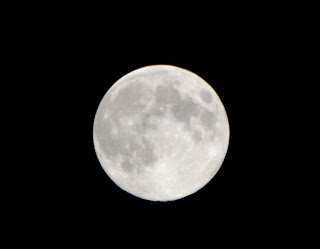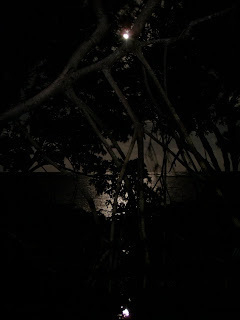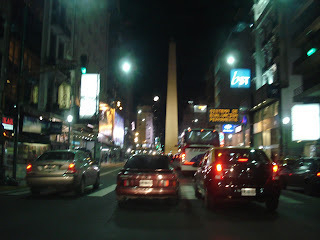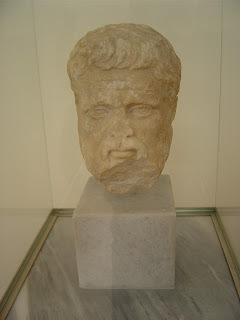Epistemology
Could a Robot Have a Mystical Experience?
This is something I've been contemplating for a while, for a variety of reasons. It's not that I think that robots are about to have organic religion (that's not for me to say) but increasingly we are delegating small decisions to machines. We should prepare ourselves for times when machines will claim the right to make big decisions. The machines might be making such claims because they are self-conscious, but they might much more easily make such claims because it's easier to sell us products or political views when they come with the stamp of the divine.
It's worth linking back here to a previous post, if only to point out how helpful Evan Selinger, Irina Raicu, and Patrick Lin have been as I think about this. None of them should be blamed for my oddities or errors, but all have helped me to think more clearly.
Faith, Hope, and Certainty
Scientia Cordis
-- Charles Peirce, "Some Consequences of Four Incapacities," (1868).
Do You Know The Phase Of The Moon?
I like to begin my class on ancient and medieval philosophy with two questions: (1) Do we know more about the moon than they knew five centuries ago? (2) Do you know what phase the moon is in right now?
Of course, most of us would say "yes" to the first question, and with good reason. After all, we've been to the moon several times, and we've brought samples back. We have remarkable technologies for remote sensing. The sciences have gone beyond what most people even a century ago could have imagined.
The second question might be harder to answer without looking up the answer somewhere. When I ask my students, usually none of them know the current phase of the moon. A recent facebook poll I gave my friends yielded many more positive replies to the second question. Not a very scientific poll, since it might be that many who did not know simply chose not to reply out of shame. Still, fewer than half of those who replied said they did know the moon's current phase.
I can think of no reason to be ashamed of not knowing the phase of the moon. Most of us have no need to know it, and I don't ask the question in order to scold my students, but to point out something about how our knowledge has changed. It seems likely to me that five hundred years ago many more people would have been aware of the phase of the moon. Children who play outside, farmers, fishers, sailors, and soldiers all wind up depending on the moon, or at least having considerable exposure to it. Today, very few of us have reason to notice it, because our lives have changed so much.
This brings me back to my first question: do we know more about the moon today than they knew five centuries ago? In one sense, the answer is still obviously "yes." But in another way, it has to be "no." Most of us (myself included) don't pay much attention to the moon. Our knowledge of its phase is not the knowledge of familiarity but rather confidence that, if we needed to know, we could look it up somewhere. We have confidence in the knowledge of our community, and of its possession of data.
Which leads me to a third question: Is it enough to know that someone else knows the answer? Sure, we don't need to know what the moon looks like right now. But if you haven't taken a little time to stare at it lately, you might have forgotten something worth knowing: the moon is beautiful. Go have a look.
******
Photos: (top) Full moon over Sioux Falls, SD, summer, 2011. (middle) The moon rises over the Atlantic and shines through mangroves in Belize, January, 2011. (bottom) The moon rises over Buenos Aires, August 2010.
"I Know That I Don't Know"?
Of course, it is a little silly and possibly self-contradictory, since knowing one thing means knowing something, while knowing nothing precludes knowing something.
Still, if Socrates said it, it's worth repeating, right? (For kicks, Google it and see how many times it is quoted authoritatively.)
But I wonder if Socrates ever said it at all.
Yes, I know that we don't know exactly what Socrates said. Socrates left us no writings, and as for transcriptions of his conversations, we have only three first-hand sources to rely on: those of Plato and Xenophon his students, and of Aristophanes his ostensible rival. It seems likely that Aristophanes did not attempt to represent Socrates accurately, nor as a philosopher. Plato may well have invented much of Socrates' dialogue as well, but he also had a stake in continuing and defending the philosophical work of Socrates in Athens.
For this reason, when philosophers refer to Socrates, we are usually referring to the Socrates found in Plato's rather extensive writings.
So did Plato's Socrates ever say "en oida oti ouden oida"? It appears not.
The closest thing I've found is a passage in Plato's Apology of Socrates, where Socrates says something that should really be translated as something like this: I do not claim to know those things that I do not know.
This is not only more reasonable, it's also good advice: don't pretend to know what you don't know and you'll avoid a lot of trouble.
It's important for another reason, though. The "en oida oti ouden oida" quote seems to be something of a staple of frosh philosophy texts and classes.
The danger here is that we will present an ancient philosopher (two of them, in this case) as though he were fairly foolish; and as a result, we will not take ancient philosophy seriously.
All it should take to cure this is a quick look at the Greek text of any of Plato's dialogues. The Phaedo, for instance, bears a slow and careful read in Greek, since no translation I've found captures all the wordplay. And as Peirce pointed out, when one reads the Greek, one discovers something else that the translators often veil from our sight: Plato's Socrates uses the language of syllogism in a way that shows that he was doing Aristotelian logic before Aristotle was.
By relying on hearsay rather than on engagement with the primary texts, we close off a path of inquiry into a whole set of ancient philosophical texts. "Doesn't their being ancient mean that they are exhausted?" you may ask. Old trees, it seems to me, may still bear rich fruit. And just as we find that old caves sometimes have rich troves of ancient unread texts, what else might we find if we take the time to read the ancients closely?
How can you know that someone is contrite?
For the last few weeks my ethics students have been studying forgiveness. One of the persistent questions about forgiveness is whether, in order to be forgiven, one must first be contrite or repentant. (We have not been speaking of the idea of God forgiving people; we’ve limited our discussion to the possibility of people forgiving other people.)
I have to confess that this posting was prompted as much by my viewing, last night, of Battlestar Galactica as by our readings. In season 3, Laura Roslin calls for a Truth and Reconciliation Commission (like South Africa’s after Apartheid) after some human-on-human atrocities. That got me thinking once again about Desmond Tutu and Simon Wiesenthal, and their respective books on forgiveness.
The easy answer to my question is to say that one does not need to be contrite to be forgiven. This is easy, but not simple, because it raises other questions about the nature of forgiveness. And it brings along with it the possibility of depriving someone of their moral agency by denying the reality of their choices.
Most of us are inclined to give the opposite answer, namely that it does not make sense to forgive those who are not sorry for their offenses.
But this raises another difficulty: how do we know when people are adequately sorry? Additionally, does this position make it more likely that we will forgive those people who only seem sorry? What if someone has expressed their contrition to the best of their ability but we have not been able to perceive it, for cultural or other reasons? What if someone is not at all sorry, but has made a convincing public show of contrition?
What do you think?



